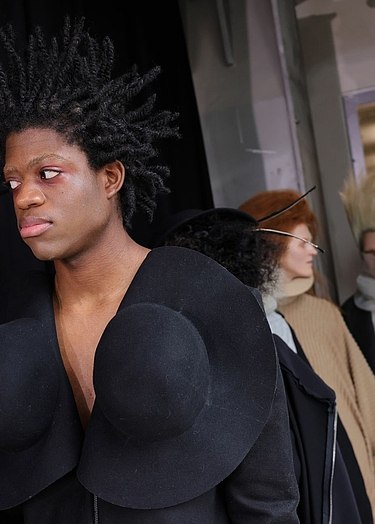
News

The various opportunities created by the connection of fashion, design and modern technologies in the e-health sector range from fitness trackers allowing to determine and measure the movements, bodily functions and the general health status of their wearer to exoskeletons, allowing paraplegic patients to walk upright. The following best-case examples show that the developments in the field of e-health go far beyond the sports watch worn on the wrist.
Berlin is an important centre of innovations in the field of e-health and smart wearables. This was clearly demonstrated during the Accelerator Programme Smart Wearables X Smart Textiles 2017. Among around 20 applications submitted for the award were numerous innovative ideas from the healthcare sector.
The startup company Ghost impressed the jury and won the competition with a soft prosthesis for arm amputees or patients who have lost sensation in their arm due to damage to the nerves. It allows the ability to regain tactile and temperature sense. The founders, Isabella Hillmer and Laura Bücheler, were awarded with a total prize money of 10,000 Euro for this innovative glove-like wearable. They explain the mode of operation as follows:
“We take advantage of the fact that the human brain is constantly changing and evolving and it never stops re-wiring. Medical specialists call this neuroplasticity. Using the glove, we want to direct new connections in the brain purposefully, thus reprogramming part of the brain.”
Among the four startups that presented their products in the finals of the Accelerator Programme Smart Wearables X Smart Textiles 2017 competition was also Smarterials Technology GmbH. The Berlin startup operating in the field of medical technology has developed surgical gloves that offer the safety of double gloving and at the same time allowing the same tactile sense of extremely thin surgical gloves. This way, it also protects operating surgeons from injuries and related infections. Therefore, this smart wearable benefits both physicians and patients.
©Smarterials Technology
Designer and design researcher Julia Danckwerth, who has a university degree in Fashion Design from Weißensee Academy of Art in Berlin and is currently doing her doctorate at Bauhaus University in Weimar, has received several prizes for her e-health projects. Her project “Soft Sensors for Humans” was developed in cooperation with HemiHelp Deutschland e. V. to provide various assistive functions that are all directly integrated into the garment. The garments can help partly paralysed patients in their daily life by providing vital supporting functions such as temperature warning against a risk of burns, tactile support for the orientation in space and a fall-detector and an emergency call button.
©Danckwerth Laboratory, Photo: Timon Beutel
Health problems may be caused through exercises, in particular when movements are not implemented properly. This is where the US tech company Wearable X comes in with their smart Nadi X yoga pant. These pants ensure the right body posture when doing sports. It shows the most effective poses for the workout. This fitness pants has woven-in technology with sensors to guide the flow with gentle vibrations for easier yoga. When paired with the Bluetooth-connected app, the smartphone shows how to adapt the yoga pose with corresponding vibrations directly from the pants.
The US company Sensoria developed a useful wearable for the feet. The Sensoria smart socks are infused with proprietary textile sensors tracking the steps, speed, distance, step length and frequency of the runner. The Sensoria Run mobile app allows the user to tailor fitness goals and track their progress. The “smart” socks do not only count steps, they also detect foot pressure. The conductive fibres relay data collected by the sensors to the user’s smartphone, providing actionable feedback on foot landing. Based on this analysis, the virtual coach motivates the user, but also provides reminders when their running form falls outside of preset parameters in order to prevent excessive joint wear.
More information:
https://projektzukunft.berlin.de/news/news-detail/ghost-gewinnt-smart-wearables-x-smart-textiles-award/
https://smarterials.berlin/de/smarterials-technology/
https://www.danckwerth.com/soft_sensors.html
https://www.wearablex.com/products/nadi-x-pant?variant=37335539664
http://www.sensoriafitness.com/technology
https://projektzukunft.berlin.de/news/news-detail/isabella-hillmer-und-laura-buecheler-ueber-ghost/